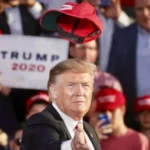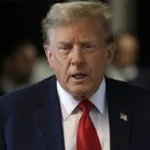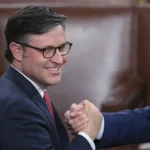Former President Donald Trump did not testify at the conclusion of his Manhattan criminal trial, despite previously indicating on multiple occasions that he would. This decision has drawn attention and criticism, with many questioning why he chose not to take the stand.
When confronted about this discrepancy outside the courtroom, Donald Trump Jr. responded to MSNBC’s Vaughn Hillyard by labeling the prosecution a “sham” from the outset. He defended his father’s decision, suggesting that the trial itself lacked legitimacy.
The trial centers on allegations that Trump created false business records to conceal a hush money payment related to an alleged affair. The case has garnered significant public and media attention, given the high-profile nature of the defendant and the serious charges involved.
“I attempted to ask multiple times about the decision for Donald Trump not to testify,” the reporter explained. “Because it was Donald Trump himself who repeatedly suggested that he would, in fact, take the stand and tell his truth to this jury. Ultimately, when the opportunity was presented to him today, the defense rested its case and chose him not to take the stand.”
‘I tried to follow up with the question: Donald Trump had the opportunity to share his version of the story with the jury, and he chose not to,” Hillyard recalled to the hosts.
“Why would you justify this insanity? Look at the clowns that they put on there — you don’t subject yourself to that nonsense,” he said, evidently speaking of the jury. “You are going into a kangaroo court. There’s nothing more. Nothing less. There’d be absolutely no reason, no justification to do that whatsoever.” “Yeah. I will testify. It’s a scam. That’s not a trial. It’s a scam…It’s not even a crime,” said Trump on April 12.
Throughout the trial, Trump teased the possibility of testifying in his own defense. However, as the trial drew to a close, he ultimately chose not to take the stand. This move has led to speculation and debate about the reasons behind his decision.
Critics argue that Trump’s failure to testify may be an indication that his legal team believed his testimony could do more harm than good. Testifying in court can be risky, as it opens the defendant to cross-examination and potential pitfalls that could weaken their case.
Supporters of Trump, however, maintain that the decision not to testify was a strategic one, aimed at undermining the credibility of the prosecution. By avoiding the witness stand, they suggest, Trump avoided giving the prosecution an opportunity to challenge his narrative directly.
Donald Trump Jr.’s remarks outside the courtroom reflect the broader sentiment among Trump’s supporters, who view the trial as politically motivated and unfair. The former president’s legal team has consistently argued that the charges are part of a broader effort to discredit him.
The trial, which focused on the alleged falsification of business records, sought to uncover the truth behind the hush money payment. The prosecution argued that the payment was intended to silence allegations of an affair, thereby protecting Trump’s public image during his presidential campaign.
As the trial concludes, the decision not to testify remains a significant point of discussion. Whether it will impact the jury’s perception and the final verdict is yet to be seen. The case underscores the complexities and high stakes involved in legal proceedings against a former president.










